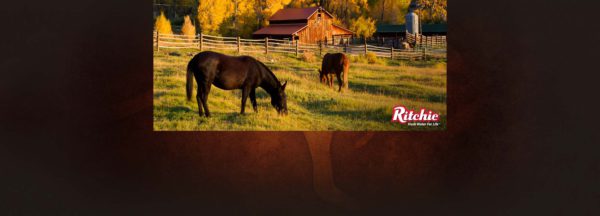Healthy Hooves Start With Hydrated Horses

By Ritchie Industries
No hoof, no horse. This old saying reflects the importance of hoof health for your horse. While there are many factors that affect hoof health, there is one nutrient that has a major impact on not only your horse’s hooves but also their overall health. That is water.
According to Gary Pusillo, Ph.D. and well-known animal nutritionist, 60 to 80 percent of a horse’s daily nutritional intake is water. As fall winds down and chilly weather sets in, hay and water consumption will increase. A typical horse will require roughly half a gallon of water for every pound of hay eaten which should equal between 10 to 15 gallons a day in winter.
Water is vital for cellular functions that help keep hoof tissues hydrated. Adequate water intake is crucial to maintain dermal blood flow to the hoof and delivering nutrients to the epidermal cells that handle hoof growth. Water is also important to keeping the hoof strong and elastic. The hoof horn is 12 to 15 percent water and needs to remain well hydrated, otherwise you’ll notice a brittle, crumbling, poor condition hoof wall. It is also thought that fluid balance within the hoof is vital for the hoof’s ability to absorb concussive impacts from the ground. The key takeaway is a healthy hoof is a well hydrated hoof.
Water Consumption is a Reliable Health Indicator
When a horse is not feeling well, they tend to reduce how much water they drink, and in turn, how much feed they consume. A drop in water consumption is a reliable indicator that something is going on. The most common issue is diarrhea. Monitoring manure will give you a heads up on how much water is being lost. On the flip side, horses who have drier or less manure production are telling you that they are not drinking enough, and an intestinal blockage or impaction colic may occur. Colic is still the number one killer of horses and increasing water intake is one of the easiest and most recommended ways to reduce the risk. A horse who is not drinking enough water can begin to experience dehydration and impaction colic in as few as 48 hours.
Make Sure Your Horse has Fresh Water on Demand at All Times
It is critical that your horse has access to an abundant source of fresh, clean water. Horses that only have access to buckets may not be drinking enough water which can leave them susceptible to hoof and health issues.
“It is very easy for horse owners to underestimate how much water their horse needs,” said Jeff Miller, Ritchie Industries Sales and Marketing Manager. “Automatic waterers like Ritchie help take the stress and guesswork out of the equation. Water is a necessity, and you need to provide as much fresh, clean water as the horse wants. Ritchie manufactures individual stall mount models, portable models and models designed for up to 40 head of horses that deliver temperature-controlled water on demand. We have a waterer that will fit your budget and your barn. You can skip the hassle of emptying, cleaning and carrying buckets to the barn and never dealing with frozen buckets again.”
Ritchie Industries, based in Conrad, Iowa, invented the first automatic waterer in 1921 and has been the industry leader ever since. Made in the USA and backed by a 10-year warranty, Ritchie’s waterers feature rugged, insulated polyethylene or stainless-steel units with designs that seal cold air away from the high-capacity valves. Options such as thermostatically controlled heat, self-regulated heaters, immersion heaters and digital water meters are also available. To find out more, visit RitchieFount.com.
